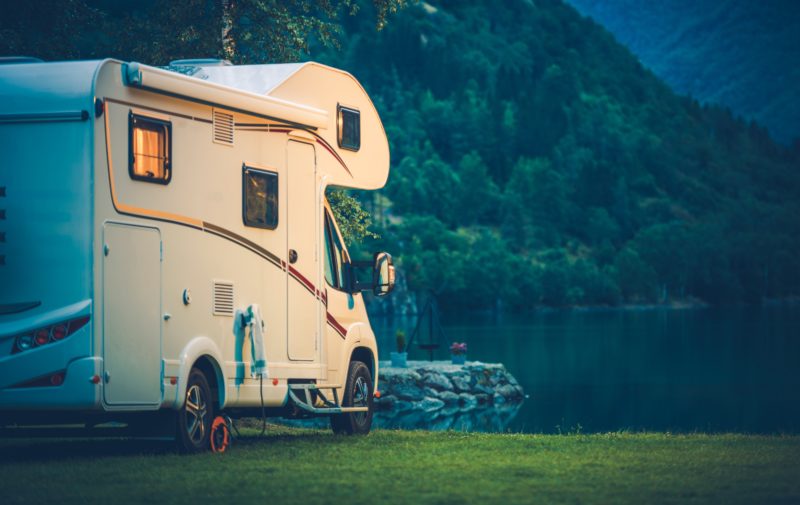
Preventing mold in an RV during storage is incredibly important, even in dryer climates like Alberta. How to prevent mold in an RV during storage is a multi-step process. Mold can grow whenever there is dampness or humidity and not enough air flow. That means that putting your RV in storage is putting it at quite a lot of risk for mold growth if the proper precautions aren’t taken. Don’t worry though, as we have all the information you need to prevent mold in your RV during storage. Here’s our top 12 tips to prevent mold in an RV during storage!
1. Buy a Dehumidifier
Buying a high quality humidifier is important to prevent mold growth on many levels. In the months that you’re camping, you should be running a dehumidifier as much as you can. This will prevent any excess dampness from building during the summer so mold doesn’t begin to grow. Before packing your RV away for storage, run your humidifier for several hours, if not a couple days. Make sure no one is using your RV in that time so as to remove as much moisture as possible. You can also buy smaller dehumidifiers that you can run the entire time your RV is in storage. If you have the power to do so, running a smaller dehumidifier the entire time your RV is in storage is a great option!
2. Use Moisture-Removing Crystals or Chemical Packets
These are similar to the packets of silica you get in most shoe or clothing deliveries. Silica packets are a great way to prevent some mold from being able to grow, but the little packages are often not powerful enough for 4 to 6 months of storage. There are other companies that create large-scale moisture removing packages. DampRid is a company that even makes items specifically catered to RVs and campers. There are hanging packets to go in closets, ones to put in cabinets, and you can place them between mattresses and the walls as well as under mattresses.
3. Wipe Down All Surfaces
This is a very important tip while you’re using your RV and before packing it away for storage. While using your RV, wipe down all the surfaces each morning for any condensation build up. As you’re putting your RV in storage, take wiping down surfaces to the next level and get in every cabinet, all the windows, the floors, and really make sure the bathroom is completely dry.
4. Open Up Your Cabinets and Closet Doors
You can do this at night as you’re using your RV for better airflow, and it also helps when you RV is in storage. If there’s any condensation or damp air trapped in the closets or cabinets, having it sealed in for several months can cause a lot of mold issues. Keeping your RV as open as possible for as much airflow can really prevent mold.
5. Remove as Much Fabric as Possible
Fabric absorbs water more than most materials, so when you’re packing your RV away for storage, be sure to remove all sheets, towels, even fabric curtains. If you have room in your home, it can even be beneficial to remove mattresses from the RV as well.
6. Ensure all Pipes are Bone-Dry
This step can save you from a lot of damage and money spent on repairs. When you’re putting your RV in storage, be sure there’s no moisture in your pipes. You can use a heater to warm all the pipes up, and you can blow everything from the pipes out. This is a great way to not only clean your pipes, but also ensure no mold can grow in them while your RV is in storage.
7. Use a Fan for Airflow
Using a fan is good for mold prevention while you use your RV and before it gets put in storage. With the windows and door open, run a fan to get as much condensation out of your RV. Note: this only works in dry climates. If you’re in a high humidity area, it’s best to not open your windows and door unless there’s definitely more humidity inside than out.
8. Run a Heater
Heat can cause humidity to dissipate. As you’re preparing your RV for storage, use a space heater to get as much moisture out as possible.
9. Thoroughly Inspect for Any Leaks or Exterior Cracks
Leaks within your RV can cause a lot of damage. Inspect your RV for any ways that moisture could escape. You can do this yourself, but inspections will be more thorough if you have a professional check out your RV. That way, you can have any necessary repairs done in a single stop!
10. Make Sure There’s Air Circulation
Contrary to what you might be thinking, you don’t want your RV to be completely sealed in. Allowing for some airflow in storage is an important part of preventing mold. Just ensure that whenever you’re storing your RV is dry. You don’t want rain or snow getting into your RV through the space you’ve left for airflow. If you’re not comfortable with leaving space for airflow, simply check on your RV more often and open up the windows and door to get some fresher air inside.
11. Inspect Your Camper at Least Once a Month
It may be tempting to lock up your RV and leave it until April, but you should avoid abandoning your RV for the winter months. Check up on your RV at least once a month to make sure that everything is fine in the mold department. You can run a fan or a higher performance dehumidifier for a couple hours, or you can simply check on the humidity removing packages and wipe everything down, checking for mold growth as you do so.
12. Be Mold Conscious While Using Your RV
This may be the most important step of all. If you’re not careful during the summer as you’re camping, something all your mold prevention efforts during storage may be futile. Run a dehumidifier as you’re camping, ensure lots of airflow, wipe down all your surfaces, avoid cooking and showering for long periods of time, and do your best to keep things dry. Being conscious of your actions and putting mold prevention tactics in place while camping is an important step in preventing mold while your RV is in storage.
Still have a few questions about RV maintenance or choosing the right RV for your family? Our team of experienced RV experts would love to speak with you! Get in touch today.




